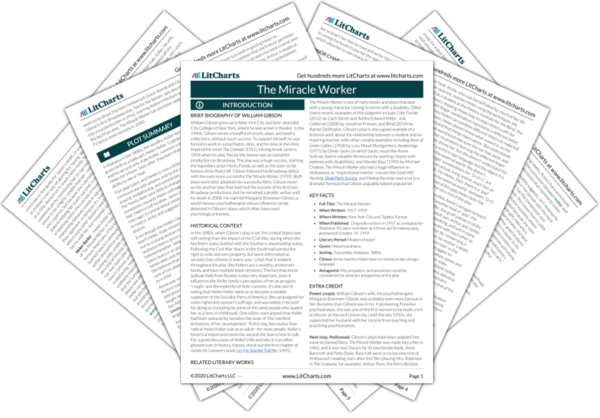As one might expect, The Miracle Worker is laden with symbols relating to sight and blindness. At one point, Annie Sullivan makes this symbolism explicit by noting, “Language is to the mind more than light is to the eye.” In this way, the play suggests that there are different kinds of “sight,” both literal and metaphorical. Helen Keller is literally blind, but more importantly, her blindness and deafness have made her ignorant of the world at large. She knows nothing of language, and therefore nothing of society. She is a wild child, who spends her days rolling around on the floor next to the family dog. This certainly doesn’t mean that Gibson is condemning blindness or blind people, but he does use Keller’s blindness as a metaphor for other types of ignorance. Helen overcomes her debilitating condition by learning to “see,” in the sense that she learns how to communicate through sign language, which in turn enables her to learn about the world.
Sight and blindness Quotes in The Miracle Worker
ANAGNOS: Deaf blind, mute—who knows? She is like a little safe, locked, that no one can open. Perhaps there is a treasure inside.

Unlock explanations and citation info for this and every other The Miracle Worker quote.
Plus so much more...
Get LitCharts A+ANNIE: I have three big advantages over Dr. Howe that money couldn't buy for you. One is his work behind me, I've read every word he wrote about it and he wasn't exactly what you'd call a man of few words. Another is to be young, why, I've got energy to do anything. The third is, I've been blind.
KELLER: Here’s a houseful of grownups can't cope with the child, how can an inexperienced half-blind Yankee schoolgirl manage her?












